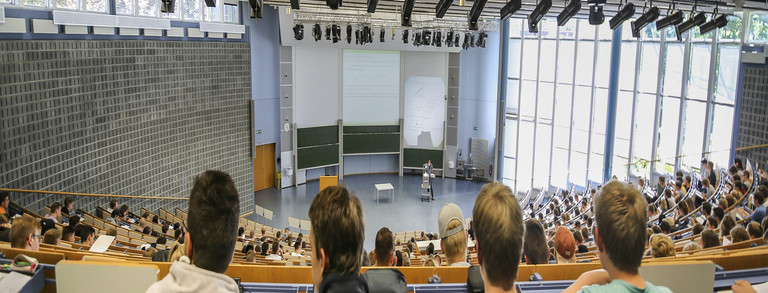Real Estate and Construction Management
Summary
| Degree | Master of Science (M.Sc.) |
|---|---|
| Subject group | Engineering Sciences |
| Standard program duration | 4 semesters |
| Admission requirements |
none
|
| Start of studies |
Winter semester
Summer semester |
| Language | German |
| Enrollment requirements | |
| Further information | Website of Department of Architecture and Civil Engineering |
Overview
Students expand their knowledge of products and processes along the whole building life cycle. They learn how to guide all the parties involved in a project and acquire comprehensive methodical and problem-solving skills within the interdisciplinary “Dortmunder Modell Bauwesen”. This empowers them to apply the skills acquired in an independent and reflective manner and to work autonomously and methodically, as they also demonstrate in their Master’s thesis.
As an alternative to increasing specialization among the various stakeholders involved in a project, the M.Sc. in Construction Management and Real Estate Management trains generalists with a high level of social skills who act as competent interlocutors for specialists, since future architects and civil engineers learn alongside each other within the “Dortmunder Modell Bauwesen” at the Department of Architecture and Civil Engineering.
This model is unique in Germany and embodies a teaching concept which aims – in addition to giving them a thorough grounding in their subject – to teach students how to work together in an interdisciplinary team with the other stakeholders involved. The projects, on which a group of both Architecture as well as Civil Engineering students work together, play a key role here. In this way, realistic planning tasks form the basis for later successful teamwork in practice.
As an option, students can complete the Master’s program with a specialization in Integrated Building Technologies.
Skills and knowledge
Prerequisite for the Master’s program in Construction Management and Real Estate Management is the successful completion of the six-semester B.Sc. in Civil Engineering or the B.Sc. in Architecture and Urban Design at TU Dortmund University. In addition, the final cumulative grade must be 2.3 or higher. In the case of applicants with another degree and/or a lower grade, the University checks on the basis of the application documents to be submitted in addition to the enrollment forms whether the degree earned is equivalent to the degree required or whether the candidate exhibits the special potential required to complete the Master’s program successfully. As a rule, a degree is regarded as equivalent if the study and examination achievements essentially equate to those of the B.Sc. in Civil Engineering or the B.Sc. in Architecture and Urban Design at TU Dortmund University in terms of content, scale and requirements and proof is produced of at least 15 credits in the areas of construction management, real estate management and construction law as well as 30 credits in the areas of construction principles (building construction, structural design).
Field of activity
Through successful completion of the Master’s program, graduates demonstrate that they are qualified for subsequent scientific work in the area of research and development and are capable of mastering ambitious professional demands in the construction and real estate sector by themselves, e.g., as executives or in senior management positions in large construction companies or with general contractors, in project planning and development, with investors or in the real estate sector.
Additional information
Possible specializations:
- Building Technology
Dortmund Model of Civil Engineering:
At the Faculty of Architecture and Civil Engineering at TU Dortmund University, architects and civil engineers are trained together in the Dortmund Model of Civil Engineering. This model is unique in Germany and embodies a teaching concept that, in addition to thorough subject-specific training in one's own discipline, aims to teach interdisciplinary teamwork with the other engineers involved in construction. A key function for learning this cooperation is played by the projects that are worked on jointly in teams by students of architecture and civil engineering. In this way, realistic planning tasks are used to create the basis for later successful cooperation in practice.




![[Translate to English:] Partner Four hands are holding the green logo of TU Dortmund University](/storages/tu_website/_processed_/1/d/csm_Partner_Nicole_Rechmann_KW_40b35bb3fd.jpg)




![[Translate to English:] Forschung An apparatus with tubes in a laboratory](/storages/tu_website/_processed_/0/c/csm_Forschung_Juergen_Huhn_cbd34afd6d.jpg)
![[Translate to English:] Studium Five students are sitting in a lecture hall. They are talking to each other.](/storages/tu_website/_processed_/c/9/csm_Studium_FelixSchmale_81d94adc86.jpg)





